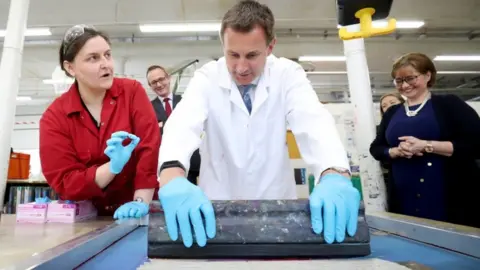Scotland Brexit: Concern over 'crass' student visa plans
 Getty Images
Getty ImagesUniversities are demanding urgent changes to student visa plans in the event of a no deal Brexit.
The Home Office has said it will offer EU students temporary leave to remain in the UK for three years.
The University of Glasgow principal, Prof Sir Anton Muscatelli, said that was "crass" because Scottish degrees typically take four years.
The foreign secretary, Jeremy Hunt, said the UK government would "take full account" of Scottish concerns.
The UK is scheduled to leave the EU on 29 March - with or without a deal.
Scottish universities are worried that leaving the EU will make it harder for them to attract European students, staff and funding.
They think student recruitment will be hampered further if there is a no deal departure because of the three year visa plan.
Sir Anton said he was "astonished" by the Home Office's approach, adding: "I think it could be really serious. I think for a lot of students it could put them off".
 PA
PAAround 9% of Scottish university students are from EU countries outside the UK and more than 4,000 enrolled through the UCAS system last year.
Scottish degree courses are typically longer than three years, as are many specialist courses throughout the UK such as medicine, dentistry and engineering.
Sir Anton, who also chairs the Russell Group of top UK research universities, wants the Home Office to reconsider its visa plan.
The Russell Group previously described three year visas as a "kick in the teeth" for Scottish higher education.
Si Anton said: "We can't have policies which are made on the hoof, which this one appears to be."
In a statement, the Home Office said: "We recognise there are a number of students on courses longer than three years, including at some Scottish universities.
"For these students, in the event of a no deal there are options available to enable them to remain in the UK for the entirety of their studies".
'Completely understand the concerns'
The suggestion is EU students could either seek to extend their stay in the UK once their temporary leave to remain expires or apply for longer visas from the outset as if they were international students from outside the EU.
One EU student, Kirsty Campbell from Germany, said she felt extra paperwork and uncertainty "would definitely mean that less students would even look into coming to Scotland".
On a visit to Glasgow University, Foreign Secretary Jeremy Hunt said UK ministers "completely understand the concerns of Scottish universities".
Speaking to BBC Scotland, he said: "The home secretary is looking at that very closely and we want to make sure that our immigration policy works with the Scottish education system, as it does for the rest of the UK".
The Scottish higher education minister, Richard Lochhead, wrote to UK immigration minister Caroline Nokes last month and has yet to receive a reply.
Mr Lochhead said the visa issue was "a further example of how Scotland's distinct and specific needs have been totally ignored by the UK government throughout the entire Brexit process".
The Scottish government currently pays the tuition costs of EU students who choose to study at Scottish universities, which is an important incentive for some.
